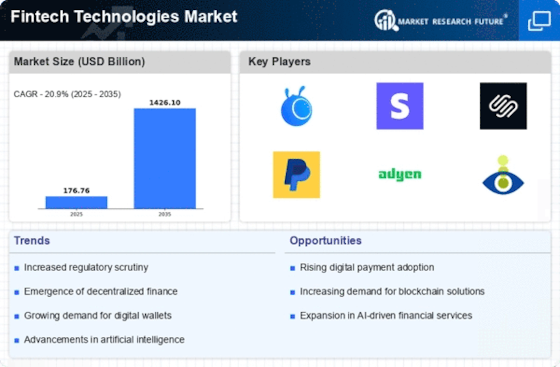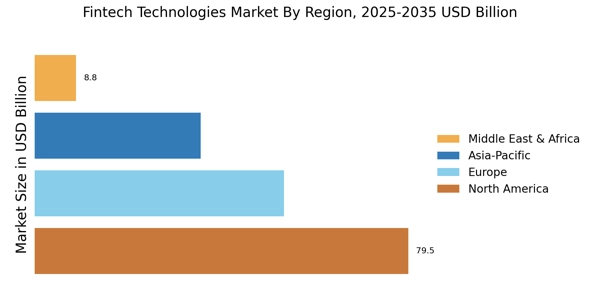Regulatory Changes and Compliance
Regulatory changes are playing a pivotal role in shaping the Fintech Technologies Market. Governments and regulatory bodies are increasingly recognizing the need for frameworks that support innovation while ensuring consumer protection. Recent initiatives aimed at fostering competition and enhancing transparency are likely to create a more conducive environment for fintech startups. For instance, the implementation of open banking regulations is encouraging banks to share customer data with third-party providers, thereby promoting innovation. This shift is expected to enhance customer choice and drive the development of new financial products. As compliance becomes a critical focus, fintech companies are investing in regulatory technology (RegTech) solutions to navigate the complex landscape, further propelling growth within the Fintech Technologies Market.
Emergence of Blockchain Technology
Blockchain technology is emerging as a transformative force within the Fintech Technologies Market. Its decentralized nature offers enhanced security and transparency, which are critical in financial transactions. The market for blockchain in financial services is expected to grow significantly, with estimates suggesting it could reach USD 22 billion by 2025. This technology not only streamlines processes but also reduces costs associated with intermediaries. Financial institutions are increasingly exploring blockchain for applications such as cross-border payments, smart contracts, and identity verification. As regulatory frameworks evolve to accommodate blockchain innovations, the Fintech Technologies Market is likely to experience accelerated adoption, fostering a more efficient and secure financial ecosystem.
Increased Adoption of Mobile Banking
The Fintech Technologies Market is witnessing a marked increase in the adoption of mobile banking solutions. As consumers increasingly prefer the convenience of managing their finances through mobile applications, financial institutions are compelled to enhance their digital offerings. According to recent data, mobile banking users are projected to reach 2 billion by 2025, indicating a substantial shift in consumer behavior. This trend is further fueled by the proliferation of smartphones and improved internet connectivity, which facilitate seamless access to banking services. Consequently, traditional banks are investing heavily in mobile technology to remain competitive, thereby driving growth within the Fintech Technologies Market. The emphasis on user-friendly interfaces and personalized services is likely to attract a broader customer base, ultimately reshaping the financial landscape.
Expansion of E-commerce and Digital Transactions
The expansion of e-commerce is significantly impacting the Fintech Technologies Market. As online shopping continues to gain traction, the demand for efficient and secure digital payment solutions is on the rise. Recent statistics indicate that e-commerce sales are projected to surpass USD 6 trillion by 2025, underscoring the need for robust payment processing systems. Fintech companies are responding by developing innovative payment solutions that facilitate seamless transactions, such as digital wallets and contactless payments. This trend is not only enhancing the consumer experience but also driving financial inclusion by providing access to payment services for underserved populations. As e-commerce continues to flourish, the Fintech Technologies Market is likely to experience sustained growth, fueled by the increasing reliance on digital transactions.
Growing Demand for Personalized Financial Services
The demand for personalized financial services is significantly influencing the Fintech Technologies Market. Consumers are increasingly seeking tailored solutions that cater to their unique financial needs and preferences. This trend is prompting fintech companies to leverage data analytics and artificial intelligence to offer customized products and services. Research indicates that personalized financial services can enhance customer satisfaction and loyalty, leading to increased retention rates. As a result, financial institutions are prioritizing the development of user-centric platforms that provide personalized recommendations and insights. This shift towards personalization is likely to drive innovation and competition within the Fintech Technologies Market, as companies strive to differentiate themselves in a crowded marketplace.

















